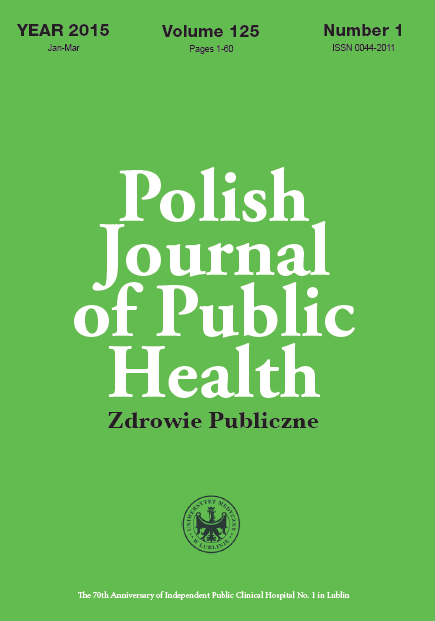Innovation in retinal diseases – ultra-widefield imaging
DOI:
https://doi.org/10.1515/pjph-2015-0014Słowa kluczowe:
ultra-widefield imaging, fluorescein angiography, fundus autofluorescence, red-free image, optical coherence tomographyAbstrakt
The understanding of retinal disease has evolved rapidly with a growing number of clinical evidence supplied by ultra-widefield retinal imaging.
Optos 200Tx ultra-widefield retinal imaging system uses a scanning laser ophthalmoscope, as well as an ellipsoid mirror. This creates a possibility of making a virtual focal point inside the eye and, in turn, enables the system to simultaneously make a single capture of the central retina and periphery. This system offers multimodal ultra-widefield imaging, including color photographs, fundus autofluorescence images, red-free images and fluorescein angiography (FA), allowing visualization of the retinal circulation. For color photographs, green and red lasers are used simultaneously to allow visualization of retinal substructures from the sensory retina and retinal pigment epithelium to the choroid.
In our clinic ultra-widefield fluorescein angiography has became an elegant diagnostic imaging modality that has improved our ability to diagnose and plan treatment strategies.
In the future widefield imaging will probably be coupled with OCT (optical coherence tomography) option to better evaluate retinal pathologies in the periphery.
Bibliografia
1. Wessel MM, Aaker GD, Parlitsis G, et al. Ultra-wide-field angiography improves the detection and classification of diabetic retinopathy. Retina. 2012;32(4):785-91. [PubMed]
2. Wessel MM, Nair N, Aaker GD, et al. Peripheral retinal ischaemia, as evaluated by ultra-widefield fluorescein angiography, is associated with diabetic macular oedema. Br J Ophthalmol. 2012;96(5):694-8.
3. Prasad PS, Oliver SC, Coffee RE, et al. Ultra wide-field angiographic characteristics of branch retinal and hemicentral retinal vein occlusion. Ophthalmol. 2010;117(4):780-4.
4. Spaide RF. Peripheral areas of nonperfusion in treated central retinal vein occlusion as imaged by wide-field fluorescein angiography. Retina. 2011;31(5):829-37. [PubMed]
5. Pe’er J, Sancho C, Cantu J, et al. Measurement of choroidal melanoma basal diameter by wide-angle digital fundus camera: a comparison with ultrasound measurement. Ophthalmol. 2006;220(3):194-7.
6. Mudvari SS, Virasch VV, Singa RM, MacCumber MW. Ultra-wide-field imaging for cytomegalovirus retinitis. Ophthalmic Surg Lasers Imaging. 2010;41(3):311-5. [PubMed] [Web of Science]
7. Cho M, Kiss S. Detection and monitoring of sickle cell retinopathy using ultra wide-field color photography and fluorescein angiography. Retina. 2011;31(4):738-47. [PubMed]
8. Schwartz SD, Harrison SA, Ferrone PJ, Trese MT. Telemedical evaluation and management of retinopathy of prematurity using a fiberoptic digital fundus camera. Ophthalmology. 2000;107(1):25-8.
Pobrania
Opublikowane
Numer
Dział
Licencja
Prawa autorskie (c) 2015 Polish Journal of Public Health

Praca jest udostępniana na licencji Creative Commons Attribution-NonCommercial-NoDerivatives 3.0 Unported License.


